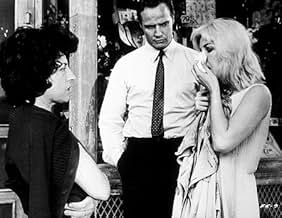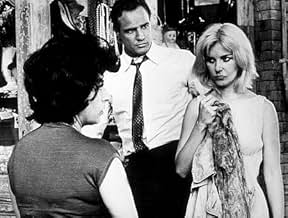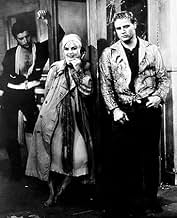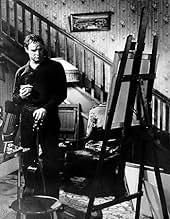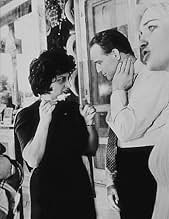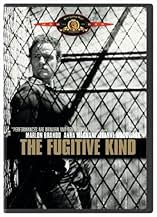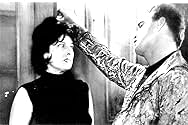IMDb RATING
7.1/10
7.8K
YOUR RATING
A guitar-playing drifter wanders into a small Mississippi town and inflames two troubled women.A guitar-playing drifter wanders into a small Mississippi town and inflames two troubled women.A guitar-playing drifter wanders into a small Mississippi town and inflames two troubled women.
- Awards
- 2 wins total
Madame Spivy
- Ruby Lightfoot
- (as Spivy)
Jeanne Barr
- Bit Part
- (uncredited)
Featured reviews
It's set in smalltown Mississippi in the 1950s and follows a down-and-out character who is trying to turn his life around and the doomed relationships into which he stumbles.
Valentine Xavier (Marlon Brando), also know as Snakeskin because of the snakeskin jacket he wears, gets out of jail in New Orleans and hits the road. His car breaks down in the middle of a rainstorm in a little Mississippi town, so he stops and gets a job in a little mercantile store run by Lady Torrance (Anna Magnani). She's lonely and has an older sick husband, Jabe (Victor Jory), who doesn't trust her or the good-looking clerk she just hired, especially when she fixes up a little bedroom for Xavier in the back of the store.
Lady Torrance gets some competition from a young rich woman, Carol (Joanne Woodward), who is often drunk and remembers Xavier from New Orleans. She's too over the top to be real competition for Lady Torrence, however.
After Lady Torrence learns her husband was among an earlier group of vigilantes that burned down her father's vineyards and home with her father inside, she is determined to open a "confectionary" attached to the mercantile store, that is designed like a vineyard. She wants Jabe to see before she allows him to die.
However, there is a conflagration at the end that unhappily resolves the plot.
This is Tennessee Williams with his grimiest southern town filled with malfunctioning human relationships. There are only dim flares of hope throughout, only to be extinguished by the end. Marlon Brando, as one reviewer put it, is "an astonishing physical specimen, a statuesque hunk with the intellectual ennui of a philosopher, who moves with a panther-like ease" and is "the misfit we all want to be." Anna Magnani is the earthy older woman who is finally trying to grasp some joy from life. They are a potent combination, though I sometimes find Tennessee Williams' words to be overwrought.
Valentine Xavier (Marlon Brando), also know as Snakeskin because of the snakeskin jacket he wears, gets out of jail in New Orleans and hits the road. His car breaks down in the middle of a rainstorm in a little Mississippi town, so he stops and gets a job in a little mercantile store run by Lady Torrance (Anna Magnani). She's lonely and has an older sick husband, Jabe (Victor Jory), who doesn't trust her or the good-looking clerk she just hired, especially when she fixes up a little bedroom for Xavier in the back of the store.
Lady Torrance gets some competition from a young rich woman, Carol (Joanne Woodward), who is often drunk and remembers Xavier from New Orleans. She's too over the top to be real competition for Lady Torrence, however.
After Lady Torrence learns her husband was among an earlier group of vigilantes that burned down her father's vineyards and home with her father inside, she is determined to open a "confectionary" attached to the mercantile store, that is designed like a vineyard. She wants Jabe to see before she allows him to die.
However, there is a conflagration at the end that unhappily resolves the plot.
This is Tennessee Williams with his grimiest southern town filled with malfunctioning human relationships. There are only dim flares of hope throughout, only to be extinguished by the end. Marlon Brando, as one reviewer put it, is "an astonishing physical specimen, a statuesque hunk with the intellectual ennui of a philosopher, who moves with a panther-like ease" and is "the misfit we all want to be." Anna Magnani is the earthy older woman who is finally trying to grasp some joy from life. They are a potent combination, though I sometimes find Tennessee Williams' words to be overwrought.
This is not a well-written film, but the acting is phenomenal. Brando and Magnani have really great chemistry and that's what carries the film. It is the acting of these two that make me want to watch this film time and time again. I didn't necessarily like Joanne Woodward in her role, it just didn't seem to fit her. It seemed like she was trying too hard or something, so I just tuned her out. But I was always tuned into Brando--its just something about him that just pulls you in--wondering what he'll do next in the scene. Anyway, The cinematography is great and adds to the moodiness of the film. Overall, the movie isn't necessarily Brando's greatest film, but it's by no means one of his worst. Unfortunately, there wasn't much to work with as far as the script, so the acting had to carry the film.
I suspect that Tennessee Williams probably agreed to change the title of his classically sounding play Orpheus Descending to The Fugitive Kind in order to insure box office. Possibly some of Marlon Brando's fans garnered from The Wild One might pay their admissions thinking they were seeing something like that. I can think of worst ways to be exposed to one of America's most respected playwrights.
This was Brando's second time doing Williams for the screen, the first time being A Streetcar Named Desire. Curiously enough this was Anna Magnani's second time doing Tennessee Williams for the screen as well, she won an Oscar in 1955 for The Rose Tattoo. So the combination of Brando and Magnani seemed a natural for the screen. I don't think The Fugitive Kind is as good as Streetcar or The Rose Tattoo, but the parts are meaty enough roles for both these honored players.
Characters seem to drift in to The Fugitive Kind from other Williams work. Brando's Val Xavier is quite like Chance Wayne in Sweet Bird of Youth, in fact in the review's title is the illusion Brando himself makes of his character. He's an early 30 something drifter with a talent for sex and music, the former probably more than the latter.
Unlike Chance, Xavier doesn't have a female keeper, but he'd like to find one. He passes up liaison with the town trollop played by a third Oscar winner in the cast, Joanne Woodward for the older and married Anna Magnani.
Magnani is trapped in a loveless marriage to a dying Victor Jory, a petty tyrant who runs the town general store. Like Big Daddy in Cat on a Hot Tin Roof, Jory is dying of cancer at a much more advanced stage of the disease than Burl Ives had. Picture Big Mama from that play hot to trot for Chance Wayne and you've got the essence of The Fugitive Kind.
Joanne Woodward has an interesting part. Part of her loose behavior is in rebellion against the time honored tradition of institutional racism that is the south that Tennessee Williams grew up in. I'm not an expert on Tennessee Williams, but of the works I've seen that are revived frequently, this is the only one where Williams directly brings up racism.
Orpheus Descending on Broadway only ran 68 performances in 1957. Two members from the Broadway cast made it to the screen, R.G. Armstrong as the sheriff repeating his role and Maureen Stapleton who had Joanne Woodward's part on stage, essays the part of the sheriff's wife who also is married to another middle aged tyrant. Considered a lesser work of Williams at first, Orpheus Descending is now revived frequently by stock theater companies everywhere. A critically acclaimed revival on Broadway in 1989 with Vanessa Redgrave and Tammy Grimes and Kevin Anderson helped bring Orpheus Descending into its proper place in the sun.
Maybe if a remake is ever done, it will even be done under its proper original title. Till then we can be well satisfied with this version.
This was Brando's second time doing Williams for the screen, the first time being A Streetcar Named Desire. Curiously enough this was Anna Magnani's second time doing Tennessee Williams for the screen as well, she won an Oscar in 1955 for The Rose Tattoo. So the combination of Brando and Magnani seemed a natural for the screen. I don't think The Fugitive Kind is as good as Streetcar or The Rose Tattoo, but the parts are meaty enough roles for both these honored players.
Characters seem to drift in to The Fugitive Kind from other Williams work. Brando's Val Xavier is quite like Chance Wayne in Sweet Bird of Youth, in fact in the review's title is the illusion Brando himself makes of his character. He's an early 30 something drifter with a talent for sex and music, the former probably more than the latter.
Unlike Chance, Xavier doesn't have a female keeper, but he'd like to find one. He passes up liaison with the town trollop played by a third Oscar winner in the cast, Joanne Woodward for the older and married Anna Magnani.
Magnani is trapped in a loveless marriage to a dying Victor Jory, a petty tyrant who runs the town general store. Like Big Daddy in Cat on a Hot Tin Roof, Jory is dying of cancer at a much more advanced stage of the disease than Burl Ives had. Picture Big Mama from that play hot to trot for Chance Wayne and you've got the essence of The Fugitive Kind.
Joanne Woodward has an interesting part. Part of her loose behavior is in rebellion against the time honored tradition of institutional racism that is the south that Tennessee Williams grew up in. I'm not an expert on Tennessee Williams, but of the works I've seen that are revived frequently, this is the only one where Williams directly brings up racism.
Orpheus Descending on Broadway only ran 68 performances in 1957. Two members from the Broadway cast made it to the screen, R.G. Armstrong as the sheriff repeating his role and Maureen Stapleton who had Joanne Woodward's part on stage, essays the part of the sheriff's wife who also is married to another middle aged tyrant. Considered a lesser work of Williams at first, Orpheus Descending is now revived frequently by stock theater companies everywhere. A critically acclaimed revival on Broadway in 1989 with Vanessa Redgrave and Tammy Grimes and Kevin Anderson helped bring Orpheus Descending into its proper place in the sun.
Maybe if a remake is ever done, it will even be done under its proper original title. Till then we can be well satisfied with this version.
The Fugitive Kind is a hot story of desire and loss and craving and heartbreak between a man and two women set in the deep south. Sounds like quintessential Tenessee Williams, and it is in spurts. Sometimes Williams leans towards being a little preachy, however true (little moments like when Brando and Stapleton have a quiet back and forth about racism via her painting kind of nails it on the head much), but it's his skills at doing melodrama that strike up the coolest beats. In fact, this is one of those super-cool movies of the late 50s that could have only starred someone like Brando, who looks at times disinterested in the scene but at the same time completely engaged, curious, smooth, harsh, and knowing of what life can bring with his trusty Ledbelly-signed guitar. It's not necessarily a towering work for the ages ala Williams collaboration 1 Streetcar Named Desire. But that doesn't mean it should be much under-looked either.
As an early effort for Lumet it's also a scorcher dramatically; he's so good with the actors that whatever little missteps the script might take in pouring on the poetic prose in how some of the characters talk (there's a scene between Brando and Anna Magnani's characters by some ruin of a spot where she says people used to make love that is actually quite boring) can be usually forgiven. Magnani especially is interesting because she should be a case of miscasting, which, apparently in later years, Lumet admitted to. She seems low-key at first, but her strengths bloom out tenfold when it comes time to act like the hard-knock-life kind of woman she is, who's in a crap marriage and had a horrible affair with a man who didn't do anything after the summer they spent together. Now she's put into a situation where she does and doesn't want this drifter, and vice versa, and she's sometimes just as cool (though also quite tough and demanding in that big Italian mama way) as her counterpart.
Meanwhile there's also Joanne Woodard, who has the kind of part many actresses love to chew on; feisty, outspoken, loud but also emotionally moody to the point that she admirably tries (and doesn't quite get to) the heights of Vivien Leigh with her classic Blanche Dubois. Overall, Lumet gets a good feel for the period- and shot in New York state no less- while working with good material and an even better cast. It won't ever be as revered as his other work, and at the same time it's much better than some would give it credit for, where the tragedy acts like another sweaty Southern caricature bemoaning existence and fitting on a bad pair of shoes.
As an early effort for Lumet it's also a scorcher dramatically; he's so good with the actors that whatever little missteps the script might take in pouring on the poetic prose in how some of the characters talk (there's a scene between Brando and Anna Magnani's characters by some ruin of a spot where she says people used to make love that is actually quite boring) can be usually forgiven. Magnani especially is interesting because she should be a case of miscasting, which, apparently in later years, Lumet admitted to. She seems low-key at first, but her strengths bloom out tenfold when it comes time to act like the hard-knock-life kind of woman she is, who's in a crap marriage and had a horrible affair with a man who didn't do anything after the summer they spent together. Now she's put into a situation where she does and doesn't want this drifter, and vice versa, and she's sometimes just as cool (though also quite tough and demanding in that big Italian mama way) as her counterpart.
Meanwhile there's also Joanne Woodard, who has the kind of part many actresses love to chew on; feisty, outspoken, loud but also emotionally moody to the point that she admirably tries (and doesn't quite get to) the heights of Vivien Leigh with her classic Blanche Dubois. Overall, Lumet gets a good feel for the period- and shot in New York state no less- while working with good material and an even better cast. It won't ever be as revered as his other work, and at the same time it's much better than some would give it credit for, where the tragedy acts like another sweaty Southern caricature bemoaning existence and fitting on a bad pair of shoes.
"Orpheus Descending" may be one of Tennessee Williams' lesser plays but this screen version, under the more commercial title "The Fugitive Kind", is a fairly juicy entertainment. thanks for the most part to the playing of Marlon Brando, Anna Magnani and Joanne Woodward. They are superb and lift the material, which is far from first-rate, to an altogether higher plain. The director was Sidney Lumet and while it may not be the best thing he's ever done, he certainly ensures we are never bored.
Williams himself adapted his play along with Meade Roberts and he signposts all the big moments well in advance. Once you hear Magnani's Lady Torrence tell of how vigilantes burned down her father's orchard with him in it, you know how things will turn out - badly! The superb cinematography, in widescreen and in black and white, is by the great Boris Kaufman and the nice, bluesy score is by Kenyon Hopkins.
Williams himself adapted his play along with Meade Roberts and he signposts all the big moments well in advance. Once you hear Magnani's Lady Torrence tell of how vigilantes burned down her father's orchard with him in it, you know how things will turn out - badly! The superb cinematography, in widescreen and in black and white, is by the great Boris Kaufman and the nice, bluesy score is by Kenyon Hopkins.
Did you know
- TriviaMarlon Brando described Anna Magnani as being equally fiery and passionate off screen. He claimed she made a pass at him in a hotel before filming began.
- GoofsAt the cemetery, Xavier returns to the car and turns on its headlights. A much brighter studio light comes on a beat too late to further illuminate the right side of the frame.
- Quotes
Lady Torrance: Tell me some more about your self-control.
Valentine Xavier: Well, they say that a woman can burn a man down, you know? But I can burn a woman down. I'm saying that I could. I'm not saying I would.
Lady Torrance: What's the matter? Have they tired you out?
Valentine Xavier: No, I'm not tired.
- How long is The Fugitive Kind?Powered by Alexa
Details
- Release date
- Country of origin
- Language
- Also known as
- El hombre de la piel de víbora
- Filming locations
- Production company
- See more company credits at IMDbPro
Box office
- Budget
- $2,000,000 (estimated)
- Runtime1 hour 59 minutes
- Color
- Aspect ratio
- 1.66 : 1
Contribute to this page
Suggest an edit or add missing content


